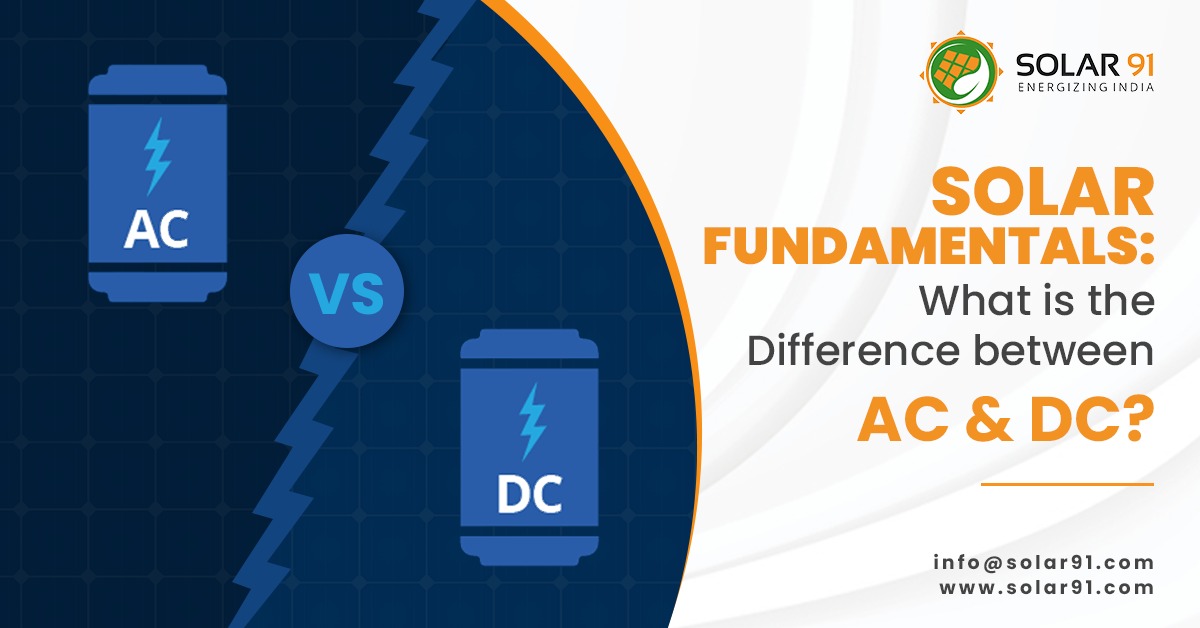Solar Fundamentals: What’s the Difference between AC & DC?
It is widely known that investing in solar energy is a significant one-time investment. It is proven that solar energy can reduce the consumption of electricity, and as a result – the electricity bill. Being the most abundant renewable source of energy, it can be seized and used in several ways.
Indian climate is warm and always sunny. Even at the time of winter we have enough sunlight to capture to turn it to our use through solar technology. It serves as an advantage to the people of our country who want to invest in solar panels to generate electricity for daily utilization. Solar energy is the finest step towards a sustainable development and investing in it ensures that you are a part of it.
What are AC and DC?
Alternating current (AC) and Direct current (DC) refers to the current flow in the electric charge. The current flow rate through your electrical appliances is determined by the rate of flow of electric charge.
It may sound a bit confusing and technical but the difference between AC and DC is quite basic and easy to understand.
- Direct current flows in a single direction and does not change its path throughout the circuit.
- Alternating current frequently changes the direction. AC moves back and forth throughout the electrical circuit.
Solar panels generate direct current (DC) electricity, which is stored in a battery, whereas in alternating current (AC) electricity is used on the grid and devices.
When put diagrammatically, the DC current moves in a straight line, like the guitar strings. However the diagram representation of an Alternating current is just the opposite of DC. It moves back and forth, like a vibration – giving a wavy movement.
These diagrams give a visual representation of the current movement through the electrical appliances or circuits.
How are AC and DC used in Solar panels?
It is often asked which form of current is used in appliances – AC or DC? The answer is ‘both’. Batteries in the solar panels use DC current to stimulate the energy and convert it into AC to be used in appliances.
Solar panels produce electricity by absorbing sunlight and then this energy in the form of electricity flows to an inverter. The captured sunlight is stored in a battery as DC and then is converted into usable AC energy. The prominent work of these solar panels is to convert this DC energy into AC. Solar panels supply electricity to different appliances that run on AC energy.
Solar panels generate direct current (DC) from sunlight. This DC is typically used for battery storage and as an auxiliary storage backup for other devices. DC devices and machines with reasonable power ratings are also compatible. Majority of appliances necessitate the use of AC (Alternating Current). Inverters can convert direct current (DC) from standard solar panels to alternating current (AC).
The only difference between AC and DC solar panels is that AC panels have built-in inverters that provide AC at the output end.
Advantages of AC setup :
There are numerous advantages to having this microinverter installed in your solar system. Microinverters can adapt to individual panel characteristics and still function properly when using different types of panels. AC panel systems are simpler to maintain because each panel has its own output that can be monitored.
Traditional Solar panels produce DC energy which is then converted into AC power by inverter. Therefore it is generally recommended to use AC solar panels as they have micro-inverters integrated into them.
The general model for storage batteries connected to solar is the same. DC batteries send power through an inverter, which converts it to alternating current (AC). “AC batteries” simply have an inverter built in, that allows them to convert DC directly into AC.
Conclusion
Whatever choice you make while purchasing a solar panel, it will always hold positivity as long as you are investing in one. Remember the way you treat nature, it will reciprocate in the same way. We are not aware of the functions and benefits of solar panels that is why it becomes necessary to have a clear guidance. Always consult an expert before making any purchase, but do invest in Solar panels. Also, understanding the distinctions between AC and DC is critical before installation.

